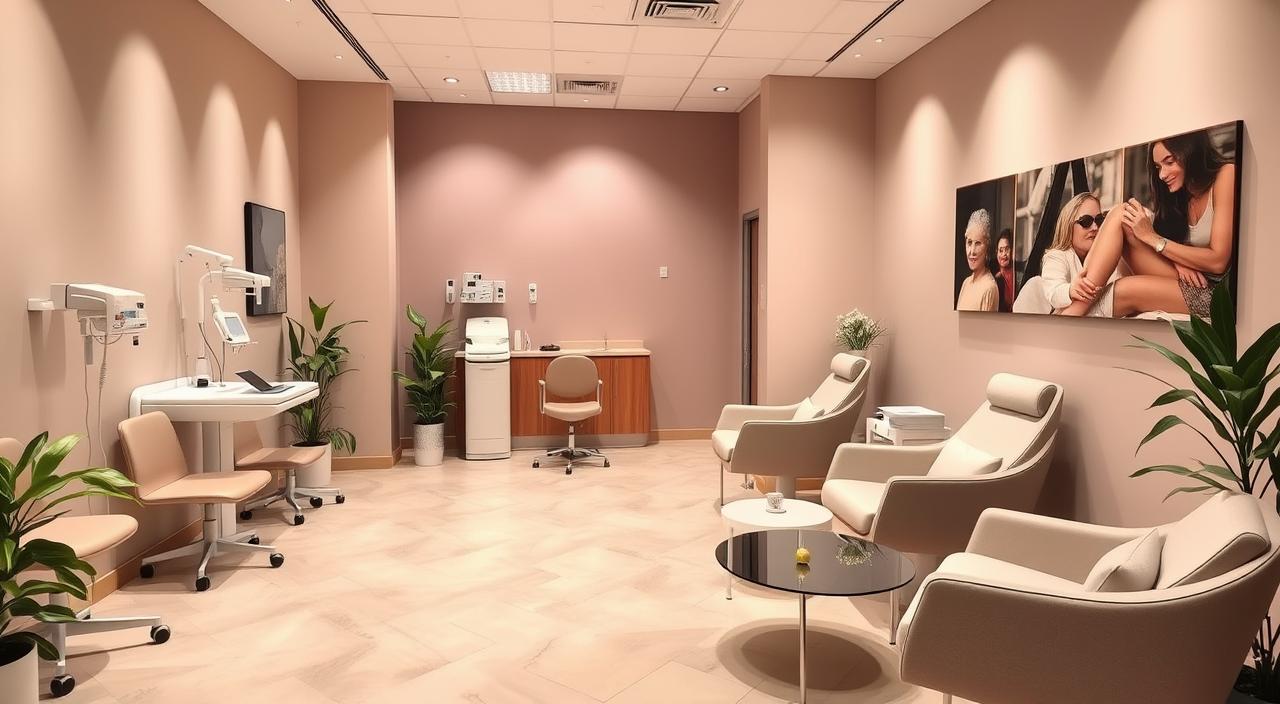As a woman, your gynecological health is key to your overall well-being. From routine check-ups to specialized treatments, a gynecologist’s care is crucial. It affects your physical, emotional, and reproductive health. In this guide, we’ll look at why expert gynecological care is important. It helps you take control of your health at every stage of life.
Key Takeaways
- Gynecological care is essential for maintaining women’s reproductive and overall health.
- Regular check-ups, screenings, and treatments can help prevent and address a wide range of gynecological issues.
- Gynecologists play a critical role in providing personalized, comprehensive healthcare for women.
- Proactive gynecological care can support women during key life stages, from adolescence to menopause and beyond.
- Integrating gynecological care with overall wellness can optimize a woman’s physical and mental well-being.
Understanding Gynecological Care
Gynecological care is key for women’s health. It deals with diagnosing, treating, and preventing issues in the female reproductive system. This field offers many services to keep women’s health in check.
Definition of Gynecological Care
Gynecological care means getting medical attention for women. It includes routine check-ups, screenings, and managing different health issues. It covers everything from preventive care to treating specific health problems.
Importance for Women’s Health
Regular gynecological care is vital for women’s health. It helps find and prevent issues like cervical cancer, ovarian cysts, and uterine fibroids early on. By getting routine check-ups and screenings, women can tackle health concerns early.
Moreover, gynecological care gives women the tools and knowledge to make smart choices about their bodies and family planning. It helps them understand their reproductive health at every life stage, from adolescence to menopause.
“Prioritizing gynecological care is not just about maintaining physical health, but also about empowering women to take charge of their well-being and make informed decisions about their bodies and reproductive choices.”
Common Gynecological Services Offered
Keeping your reproductive health in check is key. A visit to a skilled gynecologist is a must. They ensure you get the care you need. Let’s look at some common gynecological services for women.
Routine Check-Ups
Regular pelvic exams and check-ups are vital for women’s health. Your gynecologist will do a physical exam and check your reproductive health. They’ll also talk about any worries you have.
Pap Smears and HPV Testing
Cervical cancer screening is crucial. Pap smears and HPV tests are used to find abnormal cells or HPV. This can prevent cervical cancer if caught early.
Contraceptive Counseling
Your gynecologist can help you choose the right birth control. They’ll discuss pelvic exams, hormonal methods, barrier methods, and long-acting reversible contraceptives. This is based on your needs and lifestyle.
Menstrual Health Management
Gynecologists handle many menstrual health issues. This includes irregular periods, heavy bleeding, and painful cramps. They offer advice and treatments to keep your reproductive health in check.
| Gynecological Service | Purpose |
|---|---|
| Routine Check-Ups | Assess overall reproductive health and address any concerns |
| Pap Smears and HPV Testing | Detect abnormal cervical cells and screen for cervical cancer |
| Contraceptive Counseling | Explore and choose the most suitable birth control method |
| Menstrual Health Management | Address issues related to menstrual cycles and symptoms |
Regular visits to your gynecologist are key for your reproductive health and well-being. Always talk about any concerns or questions with your provider.
The Role of a Gynecologist
Gynecologists are key in women’s healthcare. They help keep women’s health in top shape. They do everything from routine checks to special treatments.
Responsibilities of a Gynecologist
Gynecologists focus on the female reproductive system. They do many important things, like:
- They do routine tests, like Pap smears, to catch health problems early.
- They help with birth control choices, guiding women on what’s best for them.
- They handle menstrual issues, like irregular periods or heavy bleeding.
- They treat conditions like endometriosis, PCOS, and uterine fibroids.
- They care for women during pregnancy and before they get pregnant.
- They offer support and teach about reproductive and sexual health.
When to See a Gynecologist
The American College of Obstetricians and Gynecologists says girls should see a gynecologist by 13 to 15. After that, regular visits are key for gynecological care and women’s health. Here are some times to see a gynecologist:
- During the teenage years for reproductive health education and screening.
- When you have gynecological symptoms or concerns, like irregular periods or pelvic pain.
- Before starting or changing birth control methods.
- When planning to become pregnant or during pregnancy for prenatal care.
- During the transition to menopause for managing symptoms.
Seeing a trusted gynecologist regularly is vital for women’s health. It helps catch and treat problems early.
Importance of Regular Screenings
Good gynecological health is key for women. Regular screenings help find and stop serious health problems early. They check for cervical cancer screening and breast cancer screening. This way, you can get help fast and have better results.
How Screenings Prevent Health Issues
Screenings look for any odd changes in your reproductive organs and health. Finding problems early means you can get the right treatment or make lifestyle changes. This can help avoid serious issues later on.
Recommended Screening Schedules
The right time for screenings depends on your age, risk factors, and health. Here are some basic guidelines:
- Pap smears and cervical cancer screenings are needed every 3 to 5 years, starting at 21.
- Breast cancer screenings, like mammograms, start at 40 and happen every year.
- Yearly pelvic exams and checkups are recommended, or as your gynecologist suggests.
Talking often with your healthcare provider is crucial. They help make sure you get the right screenings and keep your gynecological health in check.
“Early detection is key when it comes to preventing and managing gynecological health issues. Regular screenings can make all the difference in ensuring your long-term well-being.”
Specialized Gynecological Treatments
Your gynecological health needs special care and treatments. Your doctor can help with fertility and menopause symptoms. They tailor care to meet your reproductive health needs.
Fertility Assessments
Planning a family? Your gynecologist can check your fertility. They test hormone levels and check your reproductive organs. This helps create a plan to help you conceive.
Treatment for Menopause Symptoms
Menopause brings symptoms like hot flashes and mood changes. Your doctor can suggest treatments like hormone therapy. They also recommend lifestyle changes and alternative therapies to ease your symptoms.
Options for Uterine Fibroids
Uterine fibroids can cause heavy bleeding and pain. Your doctor will assess your fibroids and discuss treatment options. This could include medication, procedures, or surgery for relief.
Remember, your gynecological health is unique. Specialized treatments can greatly improve your life. Talk to your healthcare provider about fertility treatments and menopause management options that fit you.
Navigating Preconception and Pregnancy Care
Keeping your reproductive health in check is key, especially when you’re thinking of starting a family. Gynecological care is crucial for women during pregnancy. It helps ensure the health of both the mother and the baby.
Prenatal Visits
Seeing your gynecologist regularly during pregnancy is vital. These visits help track your baby’s growth and your health. You’ll get:
- Physical checks to see how your baby is doing
- Tests to spot any health issues early
- Advice on diet, exercise, and lifestyle
- Talks about your emotional health and support
Importance of Preconception Counseling
Getting preconception counseling is important before you try to conceive. Your gynecologist will cover:
- Checking for any health issues you might have
- Looking at your family’s medical history
- Making sure your vaccinations are current
- Guidance on when and how to plan your pregnancy
- Advice on taking supplements like folic acid
By focusing on preconception and pregnancy care, you can improve your reproductive health. This sets the stage for a healthy pregnancy journey.

“Investing in your reproductive health before and during pregnancy can have a profound impact on the well-being of you and your child.”
| Prenatal Visit | Key Focuses |
|---|---|
| First Trimester |
|
| Second Trimester |
|
| Third Trimester |
|
Managing Common Gynecological Conditions
Understanding and managing common gynecological conditions is key to women’s health and reproductive health. Two major issues are endometriosis and polycystic ovary syndrome (PCOS).
Endometriosis Insights
Endometriosis is a chronic condition where uterine lining tissue grows outside the uterus. It often affects the ovaries, fallopian tubes, and other pelvic areas. This can cause severe pain, heavy bleeding, and infertility in some cases.
Early diagnosis and effective management are vital. They help improve the quality of life for those with endometriosis.
Understanding Polycystic Ovary Syndrome (PCOS)
PCOS is a hormonal disorder that affects many women. It can cause irregular periods, excessive hair growth, acne, and fertility issues. It’s one of the most common reproductive health problems.
Symptoms vary, and managing PCOS often requires lifestyle changes, medication, and specialty care. Finding the right treatment is crucial for overall well-being.
Recognizing the signs of endometriosis and PCOS is the first step. Seeking medical attention is key to better women’s health. Working with a gynecologist helps navigate these conditions and find the best treatments.
Gynecological Care for Teenagers
For teenagers, navigating gynecological health is a big step. It’s key to support and guide them to keep their reproductive health in check. A gynecologist plays a big role in giving the right care and teaching about sexual health.
When to Schedule the First Visit
Experts say girls should see a gynecologist between 13 and 15 years old. This first visit is a chance to meet a healthcare provider and talk about any worries. It’s also a time to get advice on keeping reproductive and sexual health in good shape.
Education on Reproductive Health
Learning about sexual health is very important for teens. Gynecologists help by teaching them about their bodies, periods, birth control, and more. This knowledge helps teens make smart choices about their health.
- Menstrual health and management
- Contraceptive options and family planning
- Sexually transmitted infections (STIs) and prevention
- Breast self-exams and breast health
- Emotional and mental well-being related to reproductive health
Having a good relationship with a gynecologist early on is very helpful. It lets teens deal with their health with confidence. Regular visits and talking openly are key to a lifetime of good gynecological care.
The Connection Between Gynecology and Mental Health
Women’s reproductive health and mental well-being are closely tied. Issues like endometriosis and PCOS can affect a woman’s mood. It’s key to address this link for full women’s health care.
Impact of Reproductive Health on Mental Well-Being
Gynecological problems can deeply affect a woman’s mental state. Conditions like endometriosis and PCOS can lead to depression and anxiety. Infertility and menopause also bring emotional challenges.
Resources for Emotional Support
There are many resources for women dealing with these issues. Gynecologists now include mental health screenings in care. Support groups and online forums offer a place to share and find help.
“Addressing the mental health aspects of gynecological care is crucial for a woman’s overall well-being. By fostering open conversations and providing access to appropriate resources, we can empower women to prioritize both their physical and emotional health.”
Adding mental health support to gynecology care is vital. It helps women face complex issues with understanding and care. This approach improves women’s health overall.

Alternative and Holistic Approaches
In the world of women’s health, there’s a growing interest in new ways to care for ourselves. These methods aim to support our overall well-being, focusing on both our physical and emotional health.
Integrative Health in Gynecology
Integrative health in gynecology uses a variety of therapies to help traditional medicine. It looks at the mind, body, and spirit together, aiming to find the root of health problems. Practices like acupuncture, herbal medicine, and yoga help with issues like irregular periods and menopause symptoms.
Nutrition and Lifestyle Modifications
Nutrition and lifestyle changes are also key in women’s reproductive health. Eating a balanced diet rich in whole foods helps keep hormones in check and supports reproductive health. Stress management, enough sleep, and regular exercise also play a big role in gynecological health.
By taking a holistic approach to health, we can become more involved in our care. This way, we can explore different options that work with traditional medicine. It’s about finding what works best for each person, leading to better women’s health and reproductive health.
| Integrative Health Practices | Benefits for Gynecological Health |
|---|---|
| Acupuncture | Manages menstrual irregularities, reduces menopausal symptoms |
| Herbal Medicine | Addresses hormonal imbalances, supports fertility |
| Mind-Body Practices (Yoga, Meditation) | Reduces stress, enhances emotional well-being |
| Nutritional Therapy | Promotes hormonal balance, reduces inflammation |
Preparing for Your Appointment
Going to the gynecologist is key for your women’s health. To make your visit smooth, prepare ahead. This guide will help you know what to expect and what to ask.
What to Expect During Your Visit
Your visit might include several tests and talks. These can be:
- A physical exam, like a breast and pelvic check
- A Pap smear or HPV test for cervical cancer screening
- Talking about any health worries or symptoms
- Checking your reproductive and sexual health
Your doctor will focus on your needs and answer your questions. Be ready to share your health history, current meds, and any menstrual or sexual health changes.
Questions to Ask Your Gynecologist
Don’t be shy to ask your doctor questions. Some key topics to cover are:
- Any health concerns or symptoms you have
- When you should get Pap smears, mammograms, and other tests
- Birth control options and planning a family
- Ways to ease menstrual or menopause symptoms
- Healthy lifestyle tips or alternative treatments
Being ready with questions and knowing what to expect makes your gynecological care visit better. It helps you take charge of your women’s health.
Continuing Your Gynecological Care Journey
Your journey in gynecological care is ongoing. It needs a strong partnership with your healthcare provider. Building a long-term relationship with your gynecologist is key. It helps keep your reproductive health in top shape and addresses any future concerns.
Building a Long-Term Relationship with Your Provider
Trust and open communication with your gynecologist are crucial. You should feel free to ask questions and share any health changes. Your provider should be supportive and knowledgeable, working with you to meet your health needs.
Resources for Ongoing Education
Staying informed about women’s health is important. Look into reputable online resources, attend workshops, and join support groups. Learning about reproductive health and preventive care empowers you to make informed decisions about your body.
FAQ
What is gynecological care, and why is it important for women’s health?
Gynecological care focuses on the female reproductive system and health issues. It’s key for your overall well-being. It includes screenings, diagnosis, and treatments for reproductive and sexual health concerns.
What types of gynecological services are typically offered?
Services include routine check-ups and Pap smears for cervical cancer screening. You’ll also get help with menstrual issues and fertility. Menopause management and uterine fibroid care are also available.
When should I see a gynecologist, and what are their responsibilities?
See a gynecologist from adolescence and throughout your life. They handle preventive care, diagnose and treat health concerns. They also guide on maintaining your gynecological and sexual health.
Why are regular gynecological screenings important?
Screenings like Pap smears and breast exams are key for early detection. They help prevent serious health issues like cervical and breast cancer. Regular screenings protect your reproductive health.
What specialized gynecological treatments are available?
Treatments include fertility assessments and menopause management. They also address uterine fibroids. These options help with specific reproductive health concerns and improve your well-being.
How does gynecological care support preconception and pregnancy?
Gynecological care is crucial for preconception and pregnancy. It includes counseling, prenatal visits, and care during pregnancy. It ensures the health of you and your baby.
How can gynecological care impact mental health?
Gynecological health and mental well-being are closely linked. Reproductive issues can affect your emotional and mental state. Gynecologists offer support for mental health related to reproductive health.
What should I expect during a gynecological appointment, and what questions should I ask?
Expect a physical exam, discussions about your history and concerns, and recommendations. Prepare questions to make informed decisions about your care.

